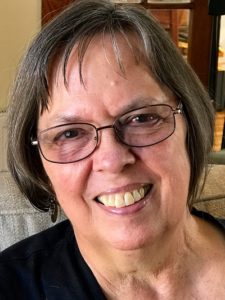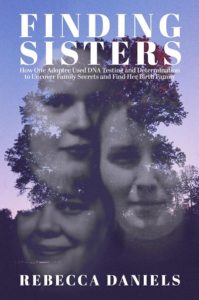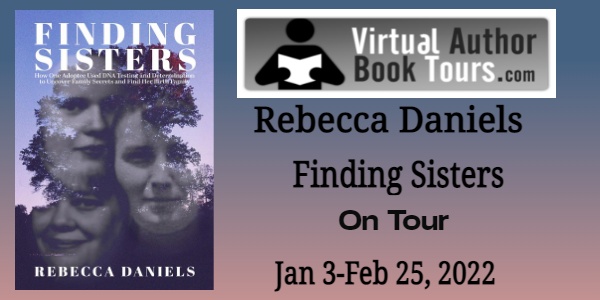Available in Print and ebook, 125 pages
Description Finding Sisters by Rebecca Daniels
Where does she come from?
Who are her genetic parents?
Who is she?
Does she even want to know?
With almost no information of her genetic heritage,
adoptee Rebecca Daniels follows limited clues and uses DNA testing,
genealogical research, thoughtful letter writing, and a willingness to make
awkward phone calls with strangers to finally find her birth parents.
But along the way, she finds much more.
Two half-sisters.
A slew of cousins on both sides.
A family waiting to be discovered.
With the assistance of a distant cousin in Sweden and several other DNA angels on the internet, Daniels finally comes face to face with her birth mother just months before her passing. Join in on this author’s discovery of family and self in ‘Finding Sisters: How One Adoptee Used DNA Testing and Determination to Uncover Family Secrets and Find Her Birth Family.’
Suzie's Review Finding Sisters by Rebecca Daniels
From the time that she was a young girl, Rebecca
Daniels always knew that she was adopted. One of her first clues was when her
parents seemed to acquire a little brother for her out of the clear blue sky
with no apparent pregnancy involved.
Daniels grew up secure and happy with her life and it
wasn't until she became an older adult, after both her parents passed, adult that she began to seriously look into
where she came from.
In 'Finding Sisters: How One Adoptee Used DNA Testing
and Determination to Uncover Family Secrets and Find Her Birth Family,' Daniels
relates her experience with finding her biological family via a lot of hard
work and with the help of some friends, family, and DNA.
After submitting her DNA to an online genetic testing
service, Daniels was given several matches in the website's database. All were
people who were genetically related to her, but none were closer than distant
cousins.
After a year of receiving hundreds of matches, she
eventually got an email from a man in Sweden who identified himself as her
distant cousin, Thomas. Although he did not know Daniels' birth parents, he
informed her that he had a keen interest in DNA and genealogy and that he would
be happy to help her track down her family.
The two communicated over email, with Daniels relating
the scant details that she was able to give and Thomas, used his internet
prowess to track down all the information he could. Soon, Thomas was able to
find Daniels' birth mother, Glenna and two half sisters, as well as some other
close family members.
Daniels was overjoyed, but hesitant as to how to
contact these family members without putting them on the spot, and thus, the
story of her memoir commences.
This is an absolutely worthwhile read that anyone who
enjoys memoirs or the television show, ‘ Long Lost Family’, would love!
Daniels' writing is stunning and her emotions are so real they jump off the
page. 5 stars to this wonderful book!
Guest Post by Rebecca Daniels
Writing about family you have known well your whole life can be challenging, charged as it could be with mysteries some folks might not want revealed or behaviors that are less than flattering. But writing about family that you have only recently discovered can be even more fraught, even if what you are writing about is entirely positive or simply speculative, especially if family members had no idea a particular mystery occurred in the first place.
When people are searching for and connecting with previously unknown genetic relatives, regardless of their initial motivation for the search, long-held secrets can often be exposed in the process. This is particularly true when adoptees like me, who have experienced a closed adoption, search for their genetic family members, many of whom might not even know the adoptee in question ever existed.
For example, in my own search I experienced this kind of resistance in one branch of my maternal relations, where a couple of distant cousins went so far as to accuse me of being a scammer who wanted something from the family and said I was impugning the memory of a beloved long-dead family member by claiming to be related to him, even as others among their siblings or cousins were welcoming to me and found my claim about the familial connection entirely plausible.
I also discovered when contacting my DNA testing matches that some people didn’t want to share their names, even with folks they knew they were genetically related to. In fact, my own brother (also adopted) used an alias when doing DNA testing because he only wanted to know ethnic information about his heritage and was not interested in connecting with any individuals with whom he might share a blood tie. There was no fear or animosity involved; he simply didn’t care about finding any new family members. The ones he already had were enough for him.
So, what does a writer do when she decides to share the story to a broader audience about the journey toward finding her new family members, whether they are welcoming or otherwise? Does she use real names and identities or not? The story is not fiction, but some of the characters involved don’t want it to be reality.
When one works with genealogy, individual and family names, which help with tracing the lineage/bloodlines of a family, can be critical information, but does everyone always need to know all the names? If it’s a family history, made for those who share that history, the answer is a definite “Yes.” But if it’s a story about finding family that will be read by others in similar situations but outside of the family in question, perhaps a more measured answer is appropriate.
When I first started thinking about writing a book about my genetic genealogy journey, I wondered what I would do about all the names involved, especially given that the families I was discovering genetic connections to often had many children in earlier generations and several involved second marriages connecting me to even more children with yet another surname. Of course, during the course of my journey I collected all the names, needed them even, to keep everyone connected but also differentiated clearly in my head. But did everyone who read about my search really need to know all those names?
I presented the chapters in draft to my women writers’ group for feedback, and they agreed that while they found the overarching story of my search engaging, the family names were often more confusing than clarifying, especially since, as readers, they had no familial connection to the people involved. The first decision I made after that helpful discussion was to eliminate all references to surnames in my manuscript, using initials instead. Those family names didn’t seem crucial for my story, and I could share them with family members who wanted to know more, if asked.
Another aspect of writing about family members is that they may not like what you have to say about them in your writing, or how you say it, even if the words are not particularly negative. And if you are in conflict with those family members for any reason, however insignificant, the situation is heightened even further. I had no interest in sugarcoating the truth about some of the uncomfortable things that happened in my encounters with new relations, or in letting previously unknown family members revise my story to fit their own comfort level, so I needed to decide what I was going to do about their given names as well. For the more distant relatives, I didn’t worry because none of them figured critically in my story, and I was fairly certain most of them wouldn’t be reading the book when it came out. But for the more immediate relatives who played prominent roles in my discoveries, I decided to ask them if they wanted to be identified by a pseudonym or by their real first names. In all cases, they were honored to be asked and happy to be identified as my new-found kin. And they all bought and read the book. I’ve had no complaints.
 About Rebecca Daniels
About Rebecca Daniels
Rebecca Daniels (MFA, PhD) taught
performance, writing, and speaking in liberal arts universities for over 25
years, including St. Lawrence University in Canton, NY, from 1992-2015. She was
the founding producing director of Artists Repertory Theatre in Portland, OR,
and directed with many professional Portland theatre companies in the 1980s.
She is the author of the groundbreaking Women
Stage Directors Speak: Exploring the Effects of Gender on Their Work (McFarland,
1996, 2000) and has been published in multiple professional theatre journals.
After her retirement from teaching, she began her association with Sunbury
Press with Keeping the Lights on for Ike: Daily Life of a
Utilities Engineer at AFHQ in Europe During WWII; or, What to Say
in Letters Home When You’re Not Allowed to Write about the War (Sunbury
Press, 2019), a book based on her father’s letters home from Europe
during WWII.
She had always known she was adopted, but it was only
as retirement approached, and with a friend’s encouragement, that she began the
search for her genetic heritage through DNA testing. Finding Sisters explores
how DNA testing, combined with traditional genealogical research, helped her
find her genetic parents, two half-sisters, and other relatives in spite of
being given up for a closed adoption at birth.
She is currently working on a new memoir about her
late-in-life second marriage and sudden widowhood titled Adventures
with the Bartender: Finding and Losing the Love of my Life in Six Short Years.
Website: https://rebecca-daniels.com/
Facebook: https://www.facebook.com/rebecca.daniels.9
Buy Finding Sisters by Rebecca Daniels
AmazonSunbury
Giveaway Finding Sisters by Rebecca Daniels
This giveaway is for 1 print copy and 1 pdf copy. Print is open to the U.S. only and pdf is open worldwide. This giveaway ends on February 26, 2022 midnight, pacific time. Entries accepted via Rafflecopter only.Follow Finding Sisters by Rebecca Daniels
Teddy Rose Book Reviews Plus Jan 3 Kickoff &
Interview
Amy Locks, Hooks and Books Jan 4 Review
Lu Ann Rockin’ Book Reviews Jan 5 Guest Post
Gud Reader Goodreads Jan 7 Review
Jas International Book Promotion Jan 10 Review
Bev Amazon Jan 11 Review
Betty Toots Book Reviews Jan 12 Review & Guest Post
Dee G. Amazon & Goodreads Jan 13 Review
Laura Lee Celticlady’s
Reviews Jan 14 Guest Review & Interview
Jas International
Book Promotion Jan 16 Facebook Live interview, 8 PM CST
Am Goodreads Jan 18 Review
Lu Ann Rockin’ Book Reviews Jan 19 Review
Gracie S. Goodreads Jan
25 Review
Teddy Rose Book Reviews Plus Jan 27 Review &
Excerpt
Sal Bound 4 Escape Jan 28 Guest Review
Suzie M. My
Tangled Skeins Book Reviews Feb 1 Review & Guest Post
Denise Amazon & Goodreads Feb 8 Review
Danielle Urban Book
Reviews Feb 10 Review & Excerpt
Bookgirl Goodreads Feb 15 Review
Lynelle Inspire
to Read Feb 21Review & Excerpt
Linda Lu Goodreads Feb 22 Review
Bee Book
Pleasures Feb 24 Review &Interview
Sage N. Goodreads Feb 25 Review



I am so glad you enjoyed 'Finding Sister'. I loved it as well!
ReplyDelete